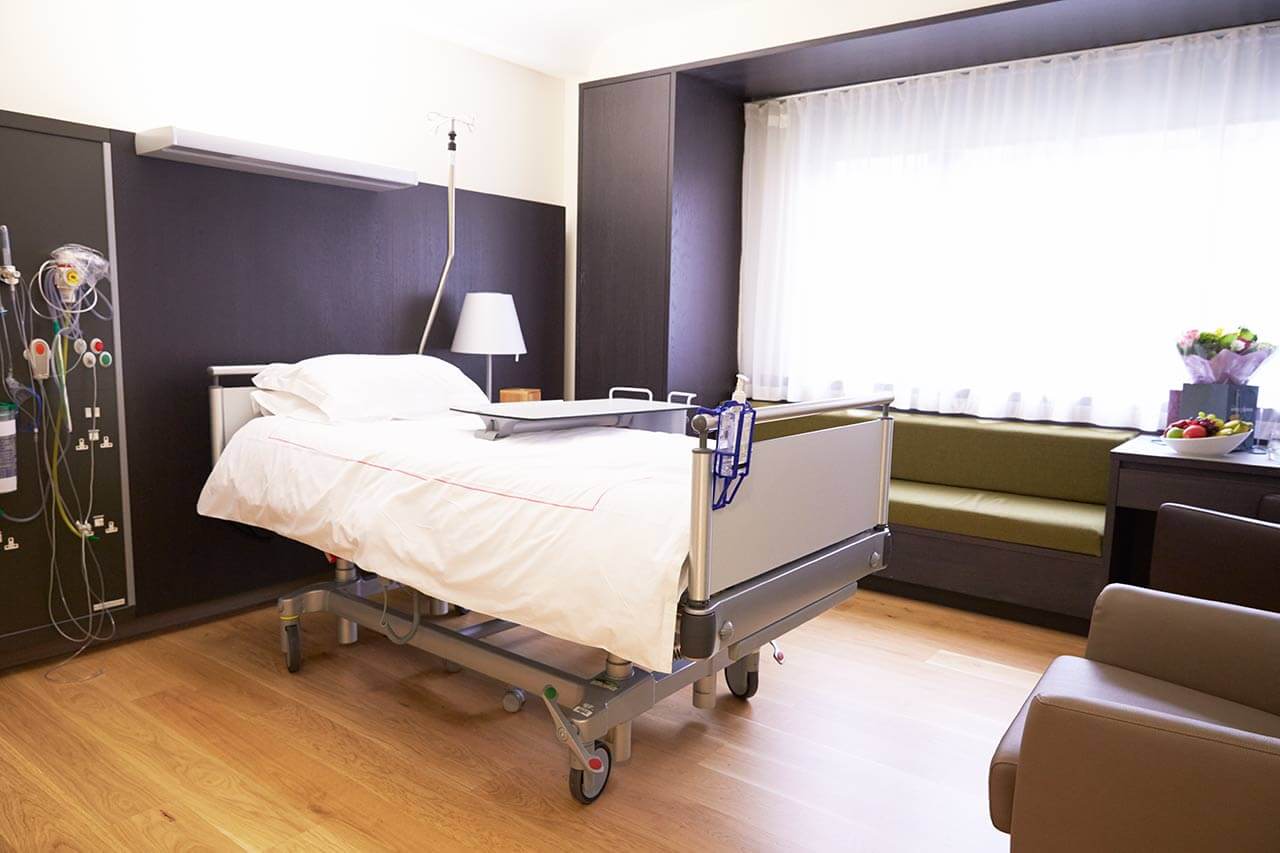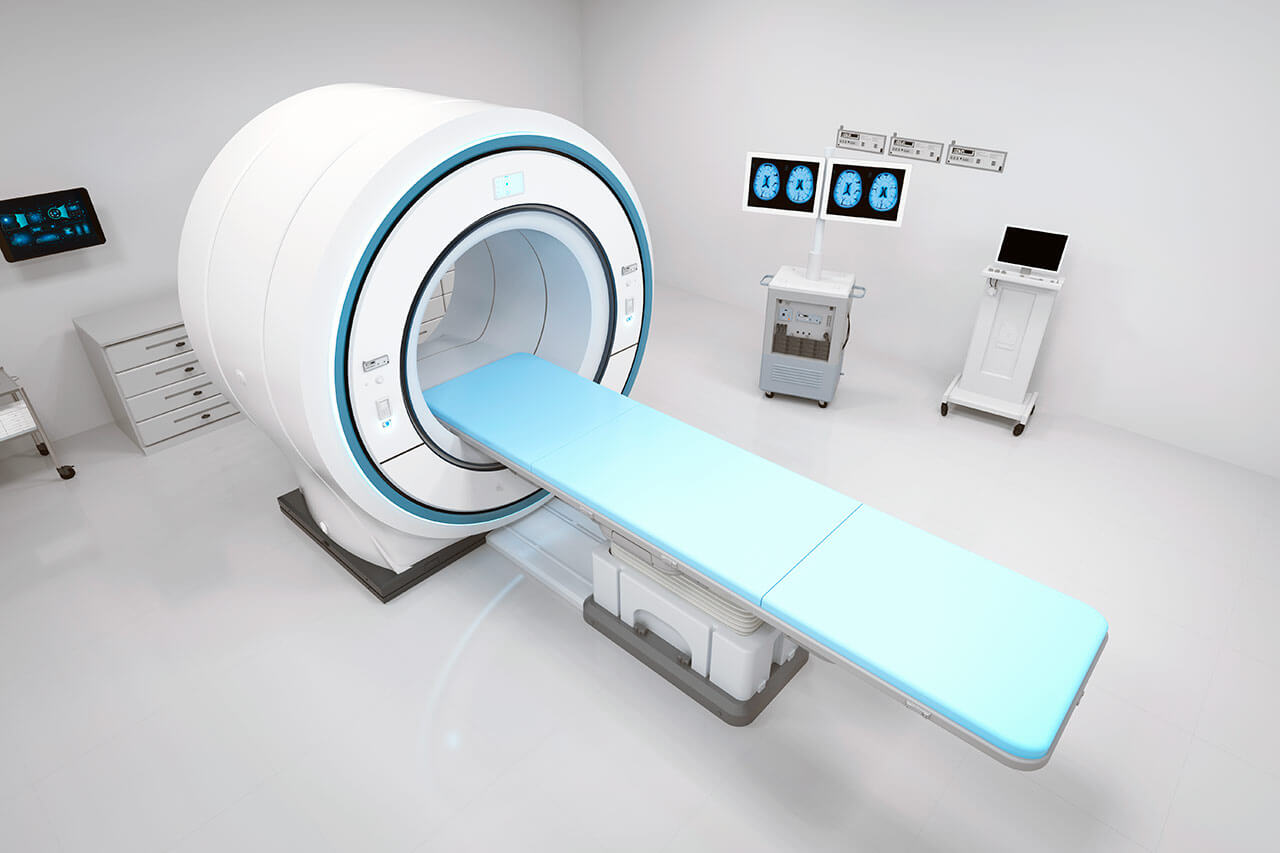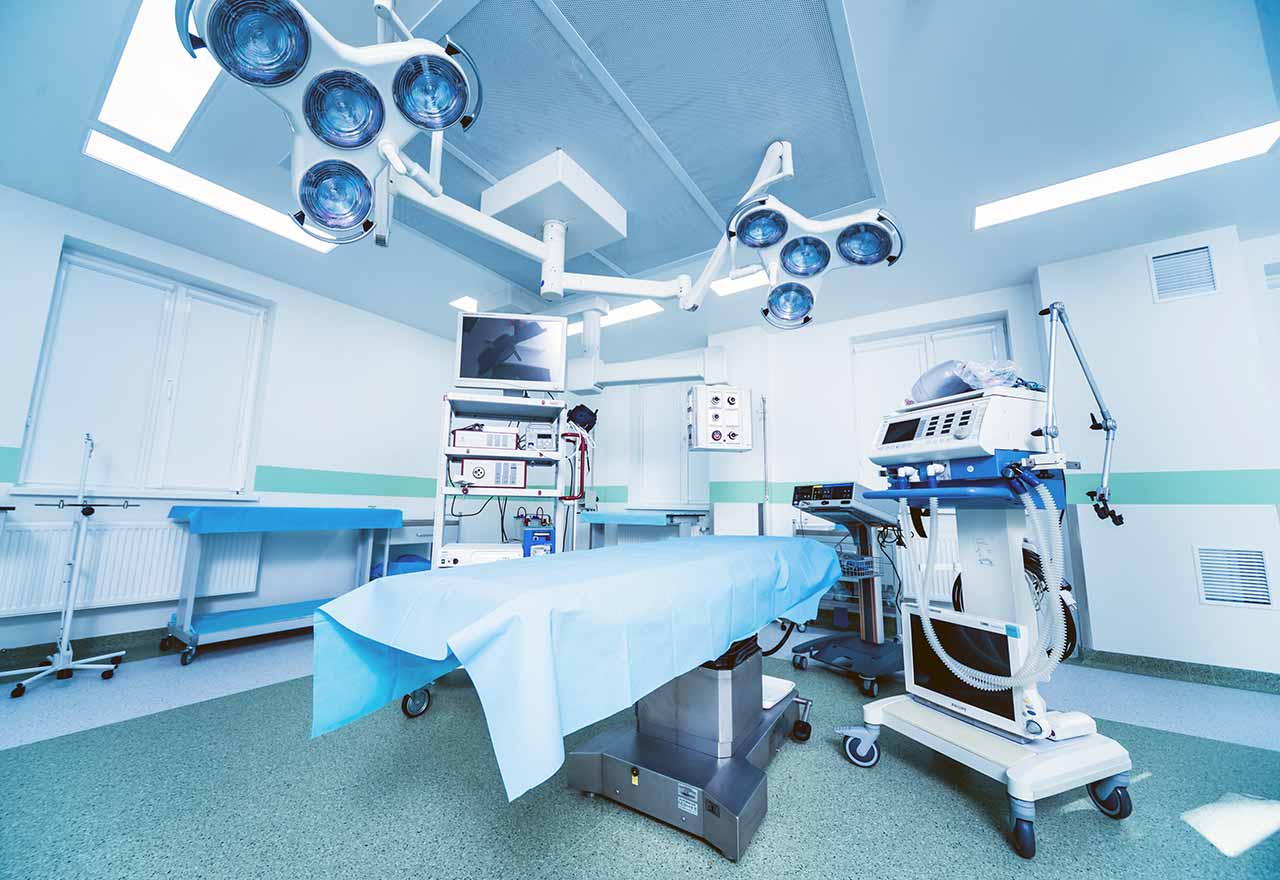
About the Department of General, Abdominal, Endocrine, Colorectal, Hepatobiliary, Bariatric Surgery, Adult and Pediatric Thoracic Surgery at Alfried Krupp Hospital in Essen-Steele
According to the Focus magazine, the Department of General, Abdominal, Endocrine, Colorectal, Hepatobiliary, Bariatric Surgery, Adult and Pediatric Thoracic Surgery at the Alfried Krupp Hospital in Essen-Steele ranks among the top German medical facilities!
The department's service range includes surgical interventions on the gastrointestinal tract, liver, gallbladder and bile ducts, rectum and anus, endocrine glands, as well as hernia repair surgery. The team of the department's thoracic surgeons admits adult patients and children with lung, pleural, mediastinal, bronchial diseases, chest wall deformities and malformations. The department includes a specialized Bariatric Surgery Center, which performs the full range of modern surgical interventions for the treatment of morbid obesity in patients with a body mass index of 40 kg/m2 and above. The department's doctors successfully use advanced surgical techniques: da Vinci Xi robot-assisted surgery, endoscopic, laparoscopic and video-assisted thoracoscopic techniques, cytoreductive surgery and hyperthermic intraperitoneal chemotherapy (HIPEC). The department enjoys the status of the Center of Excellence for Minimally Invasive Surgery, the Center of Excellence for Pancreatic Surgery, as well as the Reference Center for Colorectal Surgery and the Reference Center for Bariatric Surgery (certified by the German Society for General and Abdominal Surgery, DGAV). In addition, the department is certified according to the standards of the German Cancer Society for colon and pancreatic cancer treatment.
The Chief Physician of the department is Prof. Dr. med. Marco Niedergethmann. According to the Focus magazine, the surgeon regularly ranks among the best specialists in the area of his specialization. The doctor has long experience and constantly improves his professional skills in order to be able to offer patients surgical treatment with the very latest medical innovations.
The department's surgeons perform the greatest number of surgical procedures for gastrointestinal diseases. The medical facility that deals with the treatment of both benign and malignant pathologies. With benign gastrointestinal diseases (for example, Crohn's disease, ulcerative colitis, gastroesophageal reflux disease, diverticulitis), surgery is the last-line treatment, and therefore abdominal surgeons, together with gastroenterologists, strive to develop an optimal conservative treatment regimen. Surgery to resect the tumor and/or part of the affected organ is usually the mainstay of the treatment regimen for colon, stomach, esophageal, pancreatic, liver and peritoneal cancers. The department's surgeons prefer sparing minimally invasive techniques that involve making one or more small skin incisions, through which miniature surgical instruments and a video camera are inserted. Surgeons then perform the necessary manipulations. Such surgical procedures not only guarantee the best aesthetic result, but also provide a minimal risk of postoperative complications, as well as contribute to a significantly reduced recovery period after the intervention.
For more than 5 years, the department has been using the progressive da Vinci Xi surgical system characterized by the highest accuracy and safety for the patient. The surgical intervention is performed by the robotic arms, but a competent surgeon controls every maneuver. When performing the surgical intervention, the surgeon is sitting at a special console, which is part of the robotic device, sees images of the surgical field, and performs the necessary surgical maneuvers by grasping and moving the robotic arms. The system smoothly transmits the movements of the surgeon into the movements of the devices in real time. Such surgical procedures require only a few skin incisions 1-2 cm in size for surgical access, which is the key to the high safety of the intervention. The robot's surgical arms have seven degrees of freedom and the ability to move in a radius of 360 degrees, while eliminating the shaking of the surgeon's hands. The range of robotic interventions performed in the department includes colon resection for diverticulosis and cancer, as well as rectal surgery for oncology and rectal prolapse.
The department also successfully performs cytoreductive interventions and hyperthermic intraperitoneal chemotherapy (HIPEC) for the treatment of peritoneal cancer and destruction of abdominal metastases. When performing cytoreductive surgery, surgeons remove all visible tumor foci on the peritoneum. However, one intervention is not enough to completely destroy cancer cells, and therefore the final stage of the intervention involves hyperthermic intraperitoneal chemotherapy (HIPEC) – the patient's abdominal cavity is washed with a solution of chemotherapy agents heated to 42°C. The solution is delivered to the patient's abdominal cavity through special catheters, and the temperature of the solution is monitored using sensors. Hyperthermic intraperitoneal chemotherapy (HIPEC) is recognized as a highly effective therapeutic method, since it allows for a local administration of high doses of cytostatics, while virtually eliminating the side effects of systemic chemotherapy.
The department's surgeons are also highly professional in endocrine surgery. Patients are offered the whole range of modern surgical interventions on the thyroid gland, parathyroid glands and adrenal glands. The patients with suspected thyroid disease receive interdisciplinary medical care – the patient's clinical case is considered by an endocrinologist, an endocrine surgeon and a nuclear medicine specialist. Should the diagnosis be confirmed, the doctors of the three above-mentioned specialties jointly develop an optimal treatment regimen, with conservative methods being considered first. Surgery is usually required for patients with thyroid cancer, parathyroid and adrenal cancer, goiter, hyperthyroidism, thyroid cysts, inflammatory thyroid diseases, etc. Most surgical interventions on the endocrine glands are performed in the department using sparing minimally invasive techniques. In addition, the department's operating rooms are equipped with intraoperative neuromonitoring systems, which allow monitoring the integrity of nerve endings and exclude damage to the vocal cords during surgical interventions.
The responsibility of the department's hepatobiliary surgeons includes the surgical treatment of liver, pancreatic, gallbladder and bile duct diseases. The specialists most often perform resection surgery for benign and malignant liver neoplasms, operations for liver metastasis resection, interventions for pancreatic cancer, pancreatitis, bile duct stenosis and obstruction, surgery for gallstone removal, etc. Whenever possible, the specialists use laparoscopic surgical techniques, which involve the provision of surgical access through small incisions in the skin and soft tissues (2-3 cm). Nevertheless, in especially complex cases, surgeons have to resort to classical open surgery, for example, if it is necessary to partially resect the liver for liver cancer.
The department demonstrates excellent success rates in the treatment of rectal, anal and colon diseases, and is also certified by the German Society of General and Visceral Surgery (DGAV) as the Reference Center for Colorectal Surgery. The department's patients receive medical are from a highly qualified team of colorectal surgeons who have rich experience in the treatment of anal fissures, anal fistulas, anal abscesses, hemorrhoids, rectal prolapse, fecal incontinence, anal canal cancer, rectal cancer and other pathologies of this spectrum. The treatment involves the use of modern conservative and surgical techniques for providing minimally traumatic and effective therapy.
Thoracic surgery is an integral part of the department's clinical practice. The specialists in this field provide surgical treatment of lung, pleural and mediastinal diseases, thoracic wall deformities and congenital anomalies. The key attention in the field of pediatric thoracic surgery is paid to the correction of pectus excavatum and pectus carinatum. The department has a unique competence in the treatment of lung cancer and, in cooperation with the Bethanien Moers Hospital, forms a supraregional Lung Cancer Center certified by the German Cancer Society (DKG). The center employs thoracic surgeons, pulmonologists, oncologists, radiation therapists and other specialists who work hand in hand. Their main goal is to provide the effective treatment of lung cancer. The department's thoracic surgeons keep pace with medical innovations, so 90% of interventions on the respiratory organs are performed in the department using video-assisted thoracoscopic surgery techniques. Such surgical interventions exclude thoracotomy, which contributes to the rapid postoperative recovery of the patient and mild pain syndrome. In some cases, the department's specialists resort to hybrid surgical techniques – a combination of video-assisted thoracoscopic surgery and classic open surgical techniques.
The department’s therapeutic offer is complemented by the surgical treatment of morbid obesity. The team of bariatric surgeons annually performs more than 100 operations for rapid weight loss in patients who cannot get rid of excess weight through diet therapy, physical exercises and behavioral therapy. The most sparing interventional technique for the treatment of morbid obesity offered in the department is endoscopic intervention for an intragastric balloon implantation. A part of the balloon is regularly filled with liquid, so even after eating a small amount of food, a person feels full. An intragastric balloon is implanted for 6 months. As a rule, this period of time is not enough to get rid of obesity, and therefore this technique is very often used as a preparatory stage for further bariatric surgery in patients with a body mass index of more than 60 kg/m2. The department's team of bariatric surgeons successfully performs gastric bypass surgery, gastric banding and gastric sleeve surgery. In collaboration with plastic surgeons, skin lift is also performed after rapid weight loss. The department's specialists use only minimally invasive techniques, and therefore the patient's recovery after surgery occurs as soon as possible. To consolidate the result obtained, the patient must follow an individually developed diet and exercise regularly. Otherwise, the surgical intervention will not provide the desired result.
The department's range of surgical services includes:
- General and abdominal surgery
- Surgery for benign gastrointestinal diseases: gastroesophageal reflux disease, bile duct stenosis and obstruction, diverticulitis, ulcerative colitis and Crohn's disease
- Surgery for malignant gastrointestinal diseases: stomach, esophageal, pancreatic, liver, colorectal cancers, peritoneal cancer and abdominal metastases
- Surgery for inguinal, umbilical and incisional hernias
- Endocrine surgery
- Surgery for thyroid diseases: thyroid cancer, hyperthyroidism, thyroid adenomas and cysts, Graves' disease, inflammatory thyroid diseases
- Surgery for parathyroid diseases: benign and malignant neoplasms, hyperparathyroidism
- Surgery for adrenal diseases: benign and malignant neoplasms, Cushing's syndrome
- Colorectal surgery
- Surgery for rectal, anal and colon diseases: anal fissures, anal fistulas, anal abscesses, hemorrhoids, rectal prolapse, fecal incontinence, anal cancer, rectal cancer, constipation
- Hepatobiliary surgery
- Surgery for liver diseases: liver cancer, liver metastases, benign liver neoplasms
- Surgery for gallbladder and bile duct diseases: gallstones, bile duct stenosis and obstruction, gallbladder inflammations
- Surgery for pancreatic diseases: pancreatic cancer, pancreatic cysts, pancreatitis
- Thoracic surgery
- Surgery for lung, pleural and mediastinal pathologies, as well as diseases and abnormalities of the thorax in adults and children
- Video-assisted thoracoscopic surgery
- Atypical lung parenchyma resection, lung segment resection, lobectomy, pneumonectomy
- Lung volume reduction for pulmonary emphysema and resection for bullous emphysema
- Removal of mediastinal lymph nodes
- Resection of mediastinal tumors (for example, neuromas, pericardial cysts, bronchogenic cysts)
- Resection of thymus tumors (thymomas)
- Pleurectomy (removal of a part of the pleura)
- Thoracic sympathectomy for hyperhidrosis
- Pleural cavity sanitation for pleural empyema
- Lung decortication
- Hybrid thoracic interventions combining video-assisted thoracoscopic surgery and classic open surgical techniques
- Bronchial resection during surgery to remove tumors
- Extended interventions with the resection of the thoracic wall and vertebral bodies followed by plastic reconstruction
- Extended resections using a heart-lung machine
- Extended pleuropneumonectomy with resection of the pericardium and diaphragm for the treatment of pleural mesothelioma
- Sternotomy with removal of mediastinal tumors (for example, thymomas, teratomas)
- Resection of lung metastases
- Tracheal resection for stenosis or tumors, as well as tracheoesophageal fistulas
- Video-assisted thoracoscopic surgery
- Surgery for lung, pleural and mediastinal pathologies, as well as diseases and abnormalities of the thorax in adults and children
- Bariatric surgery
- Intragastric balloon placement (endoscopic procedure)
- Gastric bypass surgery (Roux-en-Y)
- Sleeve gastroplasty
- Gastric banding
- Da Vinci Xi robot-assisted surgery
- Colon resection for diverticulitis and cancer
- Rectal interventions for rectal cancer and rectal prolapse
- Other medical services
Curriculum vitae
Higher Education and Professional Career
- Study of Medicine at the Universities of Marburg, Heidelberg, Mannheim and San Francisco.
- 1998 Doctoral thesis defense and admission to medical practice.
- 1998 - 2012 Preparation for board certification in General, Vascular and Abdominal Surgery, Department of Surgery at the University Hospital Mannheim.
- 2006 Habilitation.
- 2008 Extraordinary Professor for Surgery at the Ruprecht Karl University of Heidelberg.
- 2010 Managing Senior Physician in the Department of Surgery at the University Hospital Mannheim.
- Since 2013 Chief Physician of the Department of General, Abdominal, Endocrine, Colorectal, Hepatobiliary, Bariatric Surgery, Adult and Pediatric Thoracic Surgery at the Alfried Krupp Hospital in Essen-Steele.
Clinical and Research Interests
- Surgical treatment of tumors.
- Surgical treatment of colorectal diseases (colon cancer, ulcerative colitis, Crohn's disease).
- Surgical treatment of pancreatic and liver diseases.
- Surgical treatment of esophageal and stomach diseases.
- Minimally invasive surgery.
- Hernia repair surgery.
- Surgical treatment of thyroid diseases.
Certificates
- 2010 Certification in the surgical treatment of pancreatic diseases of the German Society for General and Visceral Surgery (DGAV).
- 2011 Certification in the surgical treatment of liver diseases of the German Society for General and Visceral Surgery (DGAV).
- 2013 Certification in colorectal surgery of the German Society for General and Visceral Surgery (DGAV).
- 2015 Certification in bariatric surgery of the German Society for General and Visceral Surgery (DGAV).
- 2019 Certification in minimally invasive surgery of the German Society for General and Visceral Surgery (DGAV).
Photo of the doctor: (c) Alfried Krupp Krankenhaus




